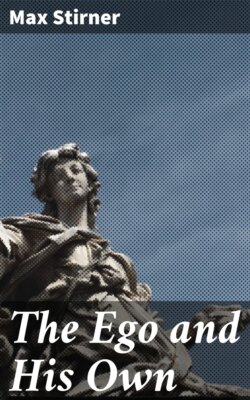Читать книгу The Ego and His Own - Max Stirner - Страница 14
На сайте Литреса книга снята с продажи.
ОглавлениеThe Stoics want to realize the wise man, the man with practical philosophy, the man who knows how to live—a wise life, therefore; they find him in contempt for the world, in a life without development, without spreading out, without friendly relations with the world, i.e. in the isolated life, in life as life, not in life with others; only the Stoic lives, all else is dead for him. The Epicureans, on the contrary, demand a moving life.
The ancients, as they want to be of good cheer, desire good living (the Jews especially a long life, blessed with children and goods), eudaemonia, well-being in the most various forms. Democritus, e.g., praises as such the calm of the soul in which one "lives smoothly, without fear and without excitement."
So what he thinks is that with this he gets on best, provides for himself the best lot, and gets through the world best. But as he cannot get rid of the world—and in fact cannot for the very reason that his whole activity is taken up in the effort to get rid of it, that is, in repelling the world (for which it is yet necessary that what can be and is repelled should remain existing, otherwise there would no longer be anything to repel)—he reaches at most an extreme degree of liberation, and is distinguishable only in degree from the less liberated. If he even got as far as the deadening of the earthly sense, which at last admits only the monotonous whisper of the word "Brahm," he nevertheless would not be essentially distinguishable from the sensual man.
Even the Stoic attitude and manly virtue amounts only to this—that one must maintain and assert himself against the world; and the ethics of the Stoics (their only science, since they could tell nothing about the spirit but how it should behave toward the world, and of nature [physics] only this, that the wise man must assert himself against it) is not a doctrine of the spirit, but only a doctrine of the repelling of the world and of self-assertion against the world. And this consists in "imperturbability and equanimity of life," and so in the most explicit Roman virtue.
The Romans too (Horace, Cicero, etc.) went no further than this practical philosophy.
The comfort (hedone) of the Epicureans is the same practical philosophy the Stoics teach, only trickier, more deceitful. They teach only another behavior toward the world, exhort us only to take a shrewd attitude toward the world; the world must be deceived, for it is my enemy.
The break with the world is completely carried through by the Skeptics. My entire relation to the world is "worthless and truthless." Timon says, "The feelings and thoughts which we draw from the world contain no truth." "What is truth?" cries Pilate. According to Pyrrho's doctrine the world is neither good nor bad, neither beautiful nor ugly, etc., but these are predicates which I give it. Timon says that "in itself nothing is either good or bad, but man only thinks of it thus or thus"; to face the world only ataraxia (unmovedness) and aphasia (speechlessness—or, in other words, isolated inwardness) are left. There is "no longer any truth to be recognized" in the world; things contradict themselves; thoughts about things are without distinction (good and bad are all the same, so that what one calls good another finds bad); here the recognition of "truth" is at an end, and only the man without power of recognition, the man who finds in the world nothing to recognize, is left, and this man just leaves the truth-vacant world where it is and takes no account of it.
So antiquity gets trough with the world of things, the order of the world, the world as a whole; but to the order of the world, or the things of this world, belong not only nature, but all relations in which man sees himself placed by nature, e.g. the family, the community—in short, the so-called "natural bonds." With the world of the spirit Christianity then begins. The man who still faces the world armed is the ancient, the—heathen (to which class the Jew, too, as non-Christian, belongs); the man who has come to be led by nothing but his "heart's pleasure," the interest he takes, his fellow-feeling, his—spirit, is the modern, the—Christian.
As the ancients worked toward the conquest of the world and strove to release man from the heavy trammels of connection with other things, at last they came also to the dissolution of the State and giving preference to everything private. Of course community, family, etc., as natural relations, are burdensome hindrances which diminish my spiritual freedom.
